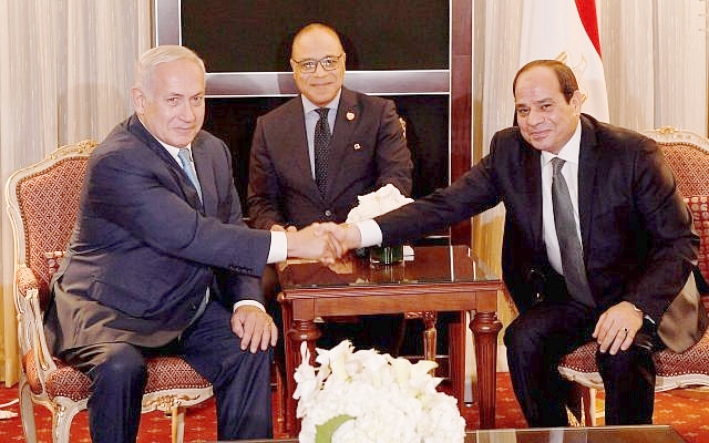Israeli-Egyptian ties have grown increasingly fragile since October 7th, and according to a Wall Street Journal report over the weekend, ties are now almost at a breaking point.
The report came a day before reports on Sunday that Israeli officials have informed the Egyptian government that it is soon launching a military operation along the Philadelphi Corridor despite Egypt’s strong objections.
Sky News Arabia reported that Egypt is furious about the matter. “The matter angered the Egyptian side, which responded with strong opposition,” the report said. “Talks began between the two parties, during which the Israeli side tried to calm Egypt down and pledged never to displace the Palestinians toward Egyptian lands.”
According to the WSJ, the reasons for the crisis in Israeli-Egyptian ties are Egypt’s fear that Israel will push a large number of Gazan refugees into the Sinai Peninsula and the decrease in traffic in the Suez Canal due to the Houthis’ attacks. Egypt lost 40% of its revenue from Suez Canal traffic this year and could lose billions of dollars if the crisis continues.
Egyptian officials told the WSJ that ties between the two countries are at the lowest point in at least two decades.
“The so-called cold peace has further cooled both on the governmental and civilian levels,” said Ofir Winter, a senior researcher at Israel’s Institute for National Security Studies.
The report continues by stating: The Gaza war has tested the relationship unlike any crisis in years. Egypt’s decision not to issue an official condemnation of the Oct. 7 attack rankled Israeli officials. Warning signs began early, when Israeli shelling hit the Rafah border crossing between Gaza and Egypt, wounding Egyptian security officials.
Israel has also pushed Egypt in recent weeks to accept an Israeli military presence along the Gaza-Egypt border and to allow Israeli personnel to conduct patrols in Egyptian territory to clamp down on what it says is Hamas weapons smuggling. Egypt rejected the proposal as a violation of its sovereignty.
Israel has also accused Egypt of allowing Hamas to smuggle weapons through Gaza’s border with Egypt. “Egypt has not done a good job of checking what’s flowing into Gaza,” said a senior Israeli military official. Egyptian officials reject the accusation.
The war has hurt the fragile economic and civilian ties. Direct flights between Cairo and Tel Aviv stopped. Israeli tourism in Egypt has all but halted. Meetings of an eastern Mediterranean natural-gas organization, a cornerstone of what had been warming economic ties, was also put on ice.
Meanwhile, the Israeli legal team at the International Court of Justice argued that Cairo is to blame for failures in delivering humanitarian aid into Gaza from Egypt’s side of the Rafah crossing.
Top Egyptian intelligence and security officials called a meeting the same day to discuss pulling the Egyptian ambassador from Tel Aviv in response to the comments.
After almost five hours of discussions, they decided it was best to instead issue a statement denying the claims, leading some who are familiar with the thinking of both sides to conclude there is still scope for calmer heads to prevail.
Channel 13 News reported last week that Egyptian President al-Sisi’s office refused repeated requests from Israeli officials to arrange a phone call with Prime Minister Binyamin Netanyahu.
(YWN Israel Desk – Jerusalem)












One Response
Is the guy on the right Jason Arnold, the actor who played George Costanza on Seinfeld?